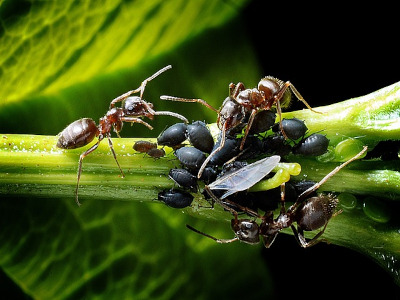Ants belong to a family called the Formicidae. Ants are eusocial incests, which means they live in highly organized social groups like bees and wasps. Scientists have described around 13,800 species. Ants are easily described by their elbowed antennae and their slender waists. Ants live in colonies, the size can range from a few dozen to millions of individuals. Ants have colonized almost every place on Earth. One reason why we can find them almost everywhere is that they have formed different relationships with other animals, like mimetic, commensal, parasitic, and mutualistic.
Aphids are small insects. They belong to a family called Aphidoidea. They are also known by names like greenfly or blackfly. Aphids have a really interesting life cycle. Usually, flightless females give birth to female nymphs, who may also be pregnant. That means that they produce really quickly. Some of the females also develop wings so that they can colonize new plants. Scientists have described around 5000 species of aphids, and around 400 of them colonize food and fiber crops. Many of them are considered pests in agriculture and forestry, and they also annoy gardeners. Ants and aphids have a mutualistic relationship. They are tending them for their honeydew, and for that, the ants protect them from predators.
Mutualism is a positive relationship between two species where the outcome for both sides is beneficial. The term mutualism doesn’t have the same meaning as symbiosis. In symbiosis, the relationship between two species is more intimate, in which one of the species lives with or inhabits the other.
Several species of ants have a mutualistic relationship with aphids. People say that the ants farm them. Aphids mainly feed on the sap from plants. While feeding on the sap, they secrete a liquid called honeydew. The secret is very sweet, and ants use it as a food source. So to make the aphids produce as much honeydew as possible, the ants farm them to the juicier parts of the plants. Ants also protect the aphids from the predators (ladybirds). They carry them into their nest for the night and also for the winter.
Scientists have even found evidence that the ants build pastures for the aphids to keep their herded aphids in control. If the ants move from their old nest to form a new one in a new location, then they take the aphid eggs with them to start a new herd.
Scientists have made more discoveries about how ants are controlling their aphid herds. Ants have the same problems with their herds as humans do. Their herds are wondering around. When the scientists discovered earlier that the ants were building the pastures, they now noticed that sometimes the ants bite the aphid wings off. Ants can also produce chemicals in their jaws that stop the development of aphid wings. But that way, they can still walk around.
Scientists have found that the black garden ant (Lasius niger) secretes chemicals on its footsteps, so the aphids become tranquilized. Ants usually produce these secrets for their family members so that they can follow them. Now they use these secrets to stop the aphids from walking off to another plant.

Sources:
https://en.wikipedia.org/wiki/Aphid
https://en.wikipedia.org/wiki/Ant
https://www.sciencedirect.com/topics/earth-and-planetary-sciences/mutualism
https://www.mcgill.ca/oss/article/did-you-know/farmer-ants-and-their-aphid-herds
https://www.nationalgeographic.com/science/article/ants-herd-aphids-with-tranquilisers-in-their-footsteps
